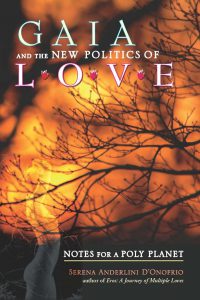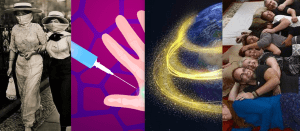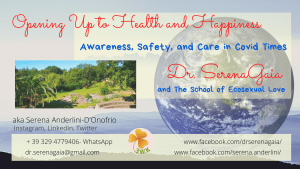Dear Earthlings:
The EcoSex course at U Conn is in process. It’s a great experience. We are reading amazing books. Thinking out of the box and across disciplines. Students are sending their responses in, with discussion questions. In class, we connect the dots: a holograph of what we’ve read together, the “required readings.” Multiple perspectives and good synergy. Here, we offer a glimpse. Lynn Margulis and Dorion Sagan’s Mystery Dance was one of two theory-of-science books. We got four responses: from John, Alissa, Rhiann, Adam, and Michael.
Here’s John‘s take:
Response to Lynn Margulis and Dorion Sagan’s Mystery Dance: On the Evolution of Human Sexuality
I came across the same problems with this book as I did with her last one. Lynn Margulis seems to know what she’s talking about scientifically (I assume, I simply don’t have the scientific background to vouch for it) but she can’t, or won’t draw conclusions. The bookend theme of Mystery Dance is the image of the ouroboros: the serpent that curves around and eats itself, creating more of itself in the process of destruction. She ends her introduction with a note on time, and ends the whole book reminding us that sexual evolution hasn’t ended. But I think the overarching theme of her book is on page 11: “The slang word for coitus simultaneously means making love and an act of aggression.” Margulis seems to imply that between modern human society and our bacterial ancestors, there was a lot of rape that wasn’t necessarily a bad thing because it contributed to human evolution. I’m not sure I agree with that.
This theme of “rape has its benefits” might not be exactly what she was aiming for, but it’s clear that Margulis believes her science leads to that conclusion, even though she doesn’t want to outright support rape (not that she, or anyone, should). She writes,
According to John Alcock, the feminist hypothesis that rape is solely an instrument of social oppression against women – a violent means of male domination without biological basis – cannot be completely correct. Alcock points to the fact that raped women are not usually in positions of social power, but, rather, they are young, often poor, and relatively defenseless women in the peak of their childbearing years… Perhaps women of childbearing age are most often raped because the mothers of rapists, perceived by the weak infant to be Godlike in their power, were also usually young women… Nonetheless, the question lingers as to whether sexual violence is partially the result of the reptilian brain developing – or misdeveloping – in sexually arousable young people. (132)
The problem I have with this isn’t so much the evolutionary implications, but that she tries to connect it to human terms. Margulis makes the connection that rape as any sort of mental activity is reptilian, base, and as close to biologically or genetically wrong as can be said, but she also says that nature has no morals, and the whole point of this book is to show us how undifferent from animals we actually are.
I have no problem with learning from animals, personifying animals, and treating animals with kindness and dignity. Those are all of the marks of an evolved culture. But evolution is kind of the point. Two mating alligators don’t view what they’re doing as sexual violence, it’s just mating to produce offspring. There is a significant lack of animal perspective in her writing on sexual violence.
I don’t have a problem with what Margulis writes, I just have a problem with the implications of the way she writes it. I think Mystery Dance is a little obsessed with the stripper allusion that she can’t draw a significant enough distance between viewer and viewed. Going to a strip club is supposed to excite and entice someone. The stripper is supposed to draw you in, not repulse you with the thought that all of her negative qualities are yours as well.
Questions for Discussion:
1. Does sexual violence have a significant role to play in human evolution?
2. Can it even be viewed as “violence” or even “sex” outside of biological terminology?
3. Is there anything inherent that separates us from animals? Or are rapists just alligators in human skin?
John Nitowski
Published with permission
WGSS 3998 – Ecosexuality and the Ecology of Love
Prof. Serena Anderlini-D’Onofrio
U Conn, Storrs, Spring 2013
Dear Earthlings:
Let “nature” be your teacher in the arts of love. Education is the heart of democracy, education to love. Come back for more wonders: Students Responses to appear every Tuesday. Book Reports to be scheduled soon, every other Thursday. Check out our summer offerings: Ecosexuality in Portland, OR, July 17-21. Info and Registration here!
Namaste,
Serena Anderlini-D’Onofrio, PhD
Gilf Gaia Extraordinaire
University of Puerto Rico, Mayaguez
Follow us in the social media
Poly Planet GAIA Blog:
http://polyplanet.blogspot.
http://polyplanet.blogspot.
Website: www.serenagaia.com
Be Appraised of Ecosex Community Project PostaHouse
Become a Fan: www.facebook.com/GaiaBlessings
Author’s Page/Lists all books:
YouTube Uploaded Videos: http://www.youtube.com/
http://polyplanet.blogspot.com













